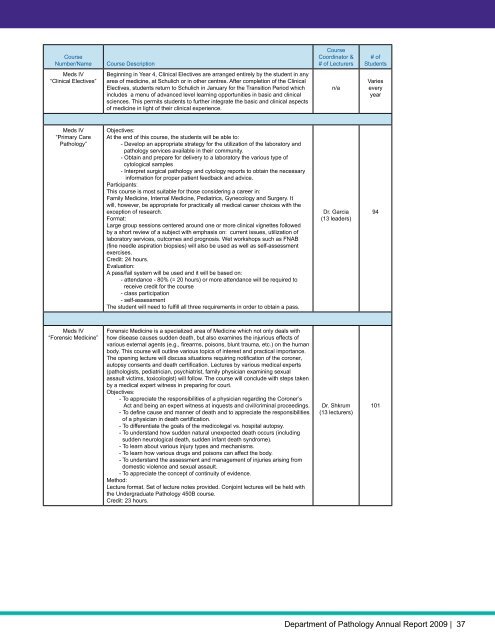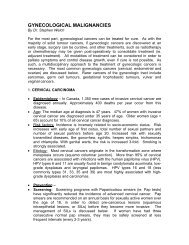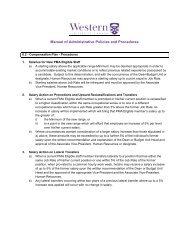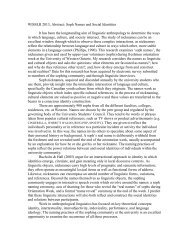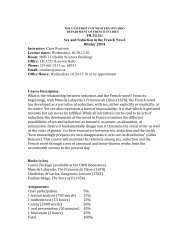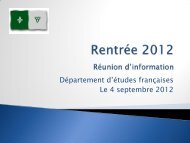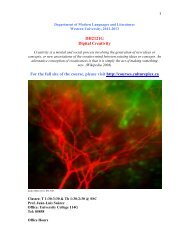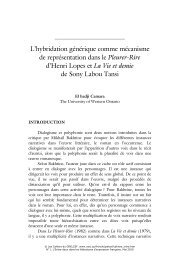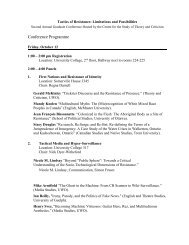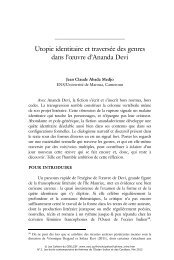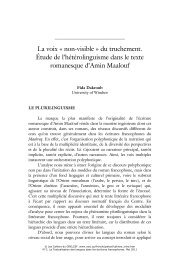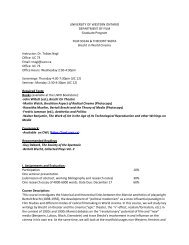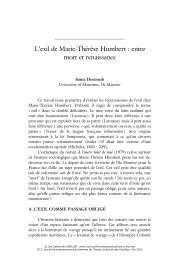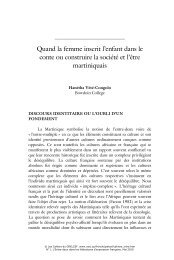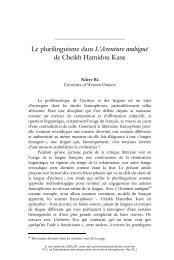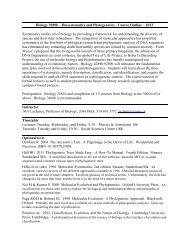Department of Pathology ANNUAL REPORT 2009 - University of ...
Department of Pathology ANNUAL REPORT 2009 - University of ...
Department of Pathology ANNUAL REPORT 2009 - University of ...
Create successful ePaper yourself
Turn your PDF publications into a flip-book with our unique Google optimized e-Paper software.
Course<br />
Number/Name Course Description<br />
Meds IV<br />
“Clinical Electives”<br />
Meds IV<br />
“Primary Care<br />
<strong>Pathology</strong>”<br />
Meds IV<br />
“Forensic Medicine”<br />
Beginning in Year 4, Clinical Electives are arranged entirely by the student in any<br />
area <strong>of</strong> medicine, at Schulich or in other centres. After completion <strong>of</strong> the Clinical<br />
Electives, students return to Schulich in January for the Transition Period which<br />
includes a menu <strong>of</strong> advanced level learning opportunities in basic and clinical<br />
sciences. This permits students to further integrate the basic and clinical aspects<br />
<strong>of</strong> medicine in light <strong>of</strong> their clinical experience.<br />
Objectives:<br />
At the end <strong>of</strong> this course, the students will be able to:<br />
- Develop an appropriate strategy for the utilization <strong>of</strong> the laboratory and<br />
pathology services available in their community.<br />
- Obtain and prepare for delivery to a laboratory the various type <strong>of</strong><br />
cytological samples<br />
- Interpret surgical pathology and cytology reports to obtain the necessary<br />
information for proper patient feedback and advice.<br />
Participants:<br />
This course is most suitable for those considering a career in:<br />
Family Medicine, Internal Medicine, Pediatrics, Gynecology and Surgery. It<br />
will, however, be appropriate for practically all medical career choices with the<br />
exception <strong>of</strong> research.<br />
Format:<br />
Large group sessions centered around one or more clinical vignettes followed<br />
by a short review <strong>of</strong> a subject with emphasis on: current issues, utilization <strong>of</strong><br />
laboratory services, outcomes and prognosis. Wet workshops such as FNAB<br />
(fine needle aspiration biopsies) will also be used as well as self-assessment<br />
exercises.<br />
Credit: 24 hours.<br />
Evaluation:<br />
A pass/fail system will be used and it will be based on:<br />
- attendance - 80% (= 20 hours) or more attendance will be required to<br />
receive credit for the course<br />
- class participation<br />
- self-assessment<br />
The student will need to fulfill all three requirements in order to obtain a pass.<br />
Forensic Medicine is a specialized area <strong>of</strong> Medicine which not only deals with<br />
how disease causes sudden death, but also examines the injurious effects <strong>of</strong><br />
various external agents (e.g., firearms, poisons, blunt trauma, etc.) on the human<br />
body. This course will outline various topics <strong>of</strong> interest and practical importance.<br />
The opening lecture will discuss situations requiring notification <strong>of</strong> the coroner,<br />
autopsy consents and death certification. Lectures by various medical experts<br />
(pathologists, pediatrician, psychiatrist, family physician examining sexual<br />
assault victims, toxicologist) will follow. The course will conclude with steps taken<br />
by a medical expert witness in preparing for court.<br />
Objectives:<br />
- To appreciate the responsibilities <strong>of</strong> a physician regarding the Coroner’s<br />
Act and being an expert witness at inquests and civil/criminal proceedings.<br />
- To define cause and manner <strong>of</strong> death and to appreciate the responsibilities<br />
<strong>of</strong> a physician in death certification.<br />
- To differentiate the goals <strong>of</strong> the medicolegal vs. hospital autopsy.<br />
- To understand how sudden natural unexpected death occurs (including<br />
sudden neurological death, sudden infant death syndrome).<br />
- To learn about various injury types and mechanisms.<br />
- To learn how various drugs and poisons can affect the body.<br />
- To understand the assessment and management <strong>of</strong> injuries arising from<br />
domestic violence and sexual assault.<br />
- To appreciate the concept <strong>of</strong> continuity <strong>of</strong> evidence.<br />
Method:<br />
Lecture format. Set <strong>of</strong> lecture notes provided. Conjoint lectures will be held with<br />
the Undergraduate <strong>Pathology</strong> 450B course.<br />
Credit: 23 hours.<br />
Course<br />
Coordinator &<br />
# <strong>of</strong> Lecturers<br />
n/a<br />
Dr. Garcia<br />
(13 leaders)<br />
Dr. Shkrum<br />
(13 lecturers)<br />
# <strong>of</strong><br />
Students<br />
Varies<br />
every<br />
year<br />
94<br />
101<br />
<strong>Department</strong> <strong>of</strong> <strong>Pathology</strong> Annual Report <strong>2009</strong> | 37


